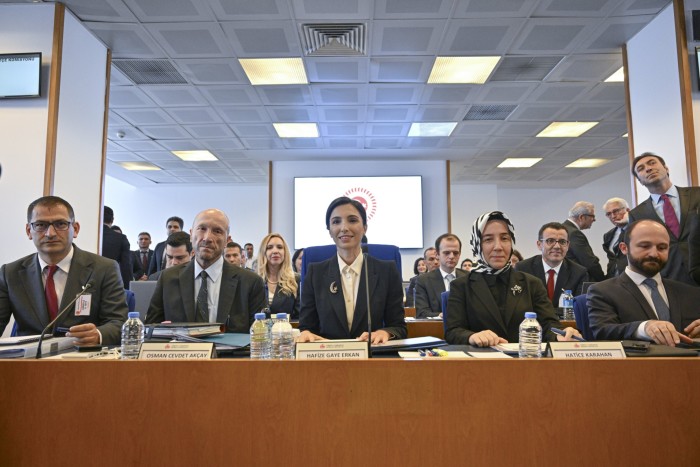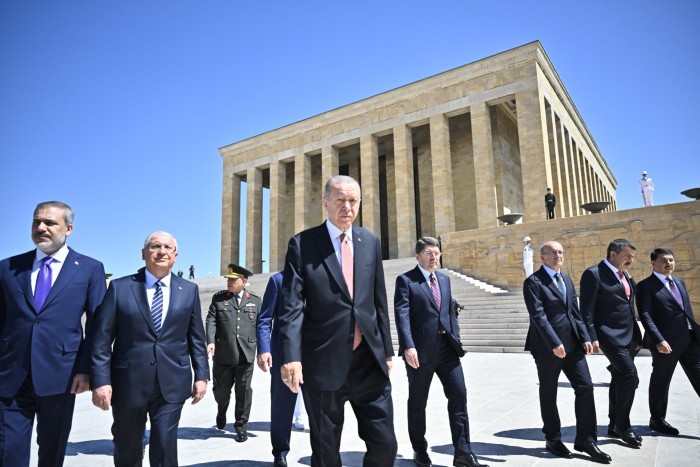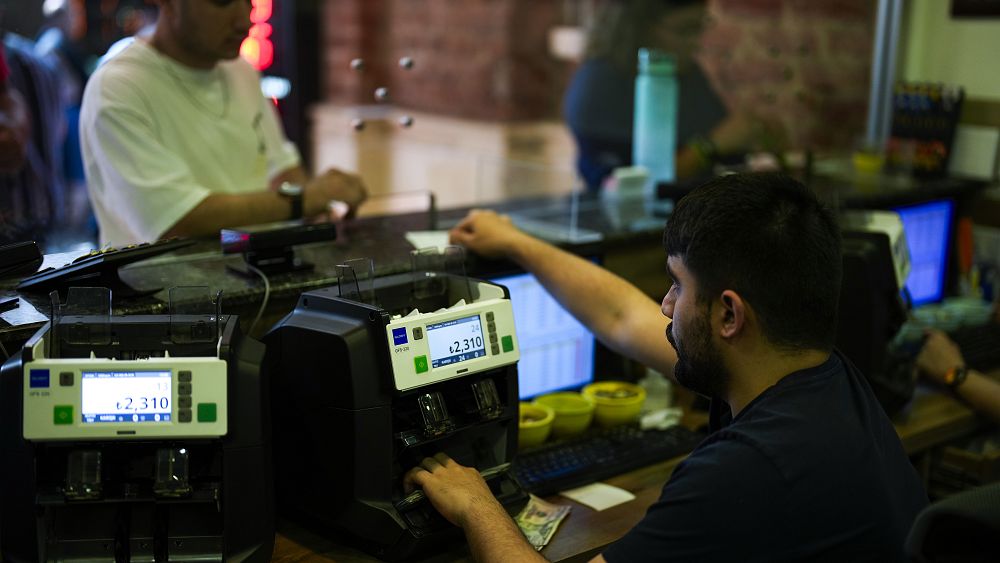Has Erdoğan really embraced economic orthodoxy in Turkey?
Recep Tayyip Erdoğan entered an auditorium in the depths of his vast palace on September 6 to a standing ovation and roaring applause from government officials and state media. Dramatic regal music blared from the speakers.
The Turkish president was there to introduce the country’s medium-term economic programme, a technical presentation that he has always delegated to his economic team. But this year, Erdoğan used the occasion to endorse a plan that marks an abrupt break from the unorthodox policies that the longtime leader has touted for years.
“With the help of tight monetary policy, we will bring inflation back down to single digits,” Erdoğan said just days after the country’s statistical body announced consumer price growth was running at about 60 per cent.
The remarks from a leader who has previously called interest rates the “mother and father of all evil”, and insisted that high borrowing costs cause rather than cure runaway inflation, reverberated across Turkey and flashed up on financial terminals around the world.

Turkish vice-president Cevdet Yılmaz tells the Financial Times that Turkey’s strongman leader was trying to make a point about his “political ownership” of the programme. “President Erdoğan himself announced the medium-term programme, that was a first and it was also a message in itself,” he says.
Yılmaz, a veteran politician in Erdoğan’s Justice and Development party (AKP), is part of a slate of senior leaders the president appointed following his re-election in May who are attempting to steer the country away from the brink. Their appointments have ignited a furious debate about whether Erdoğan has really abandoned his “new economy model” in favour of mainstream economics.
Years of unorthodox policymaking triggered a series of escalating economic crises in the country. The malaise eroded Erdoğan’s popularity ahead of May’s elections, although massive public giveaways before the polls helped Turkey’s longtime leader beat an opposition that had campaigned vigorously on the gloomy state of the $900bn economy.
“It was a policy mix that, regardless of the outcomes, actually delivered the president a bigger victory in the elections than people had anticipated. So this kind of complete reversal was unexpected,” says Paul Gamble, head of emerging Europe sovereign ratings at Fitch.
Turkey’s economy has expanded rapidly over Erdogan’s 20 years in power, with annual output growth averaging 5.5 per cent on an inflation-adjusted basis. A credit-fuelled construction boom and big investments in infrastructure and industry led to particularly big leaps in the development of Turkey’s economy from 2003 to 2013.
But the growth-at-all-costs mentality led to painful levels of inflation: consumer price growth officially has averaged 55 per cent annually since the start of 2021. The deteriorating economic backdrop and Erdogan’s increasingly tight grip on all parts of policymaking — he is on his fifth central bank chief since the start of 2019 — has also sent foreign capital fleeing Turkey’s markets in recent years.

Low interest rates have been a pillar of Erdoğan’s economic programme, but the government also took steps to “lira-ise” the economy at a time when many companies and individuals have sought refuge in dollars and gold.
Turkey has spent tens of billions of dollars since 2021 in backdoor currency interventions aimed at steadying the lira, while also deploying ever-changing rules and regulations that punish companies for holding foreign currencies. Authorities went so far as intervening in the timing and scale of corporate currency deals, according to one banker.
Erdoğan’s government also deployed a massive stimulus effort ahead of May’s election, giving away a month of free gas and boosting public sector salaries and the minimum wage.
The policies have led to huge imbalances in Turkey’s economy.
Consumers have raced to purchase items such as home appliances, fearing that with inflation running so hot, goods will be much more expensive in the future. The spending binge sharply increased imports, as did the rush among Turks to purchase gold to protect their savings.
These factors have sent Turkey’s year-to-date current account deficit to the end of July to $42bn, the second-highest gap for this time of year on records going back to 1992. And the central bank’s international reserves were severely run down to finance the big current account deficit and as authorities attempted to defend the lira, which has fallen 71 per cent against the dollar in the past three years.
Many economists were deeply worried that if Erdoğan did not change course, the country was heading for a financial catastrophe. During fiery campaign rallies, Erdoğan insisted that it was international forces rather than his policies that were hitting Turkey’s economy.
“If the previous policies were continued, it would have led to a balance of payments crisis or hard capital controls,” says Hakan Kara, a former Turkish central bank chief economist who is now a professor at Ankara’s Bilkent University.
Selva Demiralp, a former Federal Reserve economist who is now at Istanbul’s Koç University, says that the previous policies would probably have led to a “very deep recession”.
While Erdoğan has endorsed the new economic programme, investors and economists are deeply concerned over how long the president’s patience with tighter monetary policy will last. Analysts also caution that while policy is moving in a more orthodox direction, Erdoğan’s longtime focus on growth presents a serious challenge to policymakers’ attempt to rein in inflation.
The success or failure of the programme will be pivotal both to corporate Turkey and the wellbeing of everyday Turks, who have seen the value of their savings severely eroded by high inflation and a falling lira in recent years.
“I don’t know if [the new policy] is really a U-turn or if it’s a detour,” Demiralp says.
‘Sea change’ in policy
Leading the effort to restore what he has described as “rational” policymaking is Mehmet Şimşek, a former senior Merrill Lynch bond strategist who was appointed finance minister in early June. “The entire programme is based on rebalancing the economy and moderating domestic demand,” Şimşek tells the FT.
Over the past four months Şimşek has pushed for investor-friendly officials to be installed by the president in senior policymaking roles as his team attempts the complex process of unknotting years of unconventional policies. The appointment of former Goldman Sachs banker Hafize Gaye Erkan as the first female central bank chief was seen as a particularly important step towards economic orthodoxy.

“There’s been a very significant overhaul in economic policy,” Gamble says.
Policymakers’ most immediate challenge is restoring price stability while also balancing president Erdoğan’s long-held preference for strong economic growth, according to multiple officials and local economists.
“We want to see more price stability, financial stability, but we do also want to continue with a reasonable rate of growth and employment because we are a developing country,” vice-president Yılmaz says, adding that: “President Erdoğan always emphasises . . . investment, employment, production and exports so this perspective will continue.”
Gamble says the most notable shift in Turkey’s economic programme so far is a “sea change” in monetary policy. The central bank has hoisted interest rates from 8.5 per cent prior to Erkan’s appointment in June to 30 per cent.
Erkan, who specialises in developing complex risk management models for banks, has said she will take a “holistic” approach to monetary policy. “You have to take very careful steps” and act with “precision”, Erkan said in July as she unveiled her first inflation report as central bank governor.

Erdoğan just a day later replaced a trio of deputy central bank governors. Among the new appointees was a former New York Fed economist in a hiring decision widely seen as a step towards more mainstream policies.
While the rate rises are also viewed as a step in the right direction, there is a sense among economists that policymakers have a long way to go before normal policy is restored.
Gamble notes that the central bank’s rate of 30 per cent is drastically below the inflation rate of 62 per cent. Years of unconventional policies have “severely compromised” the transmission mechanisms that would usually cause rises in the central bank interest rate to filter through to the rest of the economy, he adds. “Getting monetary policy to a place in which it would function normally is still quite a long way off,” he says.
Fiscal manoeuvres
Beyond the technicalities of monetary policy it is Turkey’s fraught politics that haunts investors, who have witnessed several abrupt turnarounds after purported shifts towards economic orthodoxy.
The most recent example was just two years ago, when central bank chief Naci Ağbal was sacked just months into his term after he boosted interest rates. Şimşek, who is well regarded by foreign investors, himself quit as deputy prime minister in the Erdoğan government in 2018 after the president installed his son-in-law Berat Albayrak as finance minister.
It is not known exactly what pushed Erdoğan to change course on economic policies this time. But many executives have been frustrated with the erratic implementation of new policies and changes to existing ones, which they complain make it very difficult to do business. Haluk Bayraktar, chief executive of drone maker Baykar, one of Turkey’s most important companies, in June publicly endorsed higher-rate policies.
“If inflation is cancer, interest is chemotherapy. Of course, the ideal is for both to be at low levels. However, at this stage, inflation remains the most important problem we need to overcome,” said Bayraktar, whose brother Selçuk is Erdoğan’s son-in-law.

Still, a former senior policymaker who insists on anonymity says that he strongly doubts Erdoğan has changed his mind on interest rates and cautions that the president could lose patience at any time.
When asked whether Erdoğan still supported his theory that high interest rates cause rather than cure inflation, Yılmaz says: “We are expecting that with implementing these policies in the medium to long term, both inflation and interest rates will go down.”
Next year’s local elections, in which Erdoğan’s AKP is seeking to seize back control of Turkey’s biggest city, Istanbul, as well as the capital Ankara, are seen as a pinch point. “The biggest risk is the intolerance of the politicians to an economic downturn, especially before the local elections in March 2024,” Bilkent University’s Kara says.
Şimşek says Turkey must be “patient” with the economic overhaul, warning that while there is “strong evidence confidence is returning . . . it’s still challenging”. He says that “monetary and fiscal policy are [already] much tighter than the central bank policy rate alone suggests”, adding that “we have already taken dramatic measures”. For example, rules were changed to push banks to reduce commercial lending, as well as vehicle and credit card loans, while making it harder for consumers to get second mortgages.
There has also been a major tightening in fiscal policy. Turkey tripled petrol taxes in July, while also increasing value-added taxes on a wide array of goods and services. This was seen as particularly important because the bill to rebuild the huge swath of southern Turkey that was wrecked by February’s earthquake may stretch to $110bn. The country expects repair costs to inflate the central government budget deficit to 6.4 per cent of gross domestic product this year, compared with the average of 2.4 per cent from 2003 to 2022.
“Turkey has proved its fiscal discipline in the past, and we will do the same in the future,” Yılmaz says, citing steps to increase government revenues coupled with “cautious” spending plans.
Turkey is also seeking to slowly unwind a $121bn scheme, launched in late 2021, which pays depositors at the government’s expense when the lira depreciates, Şimşek says. The programme, known locally as KKM, was a centrepiece of Erdoğan’s unconventional policy mix, but analysts say it is deeply problematic because it links Turkey’s public finances with the performance of the lira. It is also inherently stimulative to the economy since it pays out to consumers and businesses whenever the lira falls.
“KKM is an automatic risk amplifier . . . any sharp increase in the [dollar against the lira] creates an almost immediate monetary expansion, which makes it difficult for the central bank to control the money supply,” Kara says.
The KKM programme is also an obstacle for the government’s attempt to allow the lira to fluctuate more freely as it lets up on a costly process to defend the currency. The lira has already fallen about 25 per cent against the dollar since the start of June, but some economists say the currency must fall further still to reflect Turkey’s economic fundamentals.
Taken together, “what [the new measures] are doing is actually trying to change the composition of growth”, says Koç University’s Demiralp. She says the goal is to cool inflation without slowing down the economy to the point that it creates a political headache for Erdoğan.

The new model relies on sharply reducing consumption, while at the same time accelerating exports and ramping up investment from local businesses and foreign investors, Demiralp says. She adds that the strategy is “risky” because it relies on the assumption that businesses have the confidence to invest in Turkey’s economy, something that has been lacking for years as regular changes in policy have left many corporate executives skittish.
The new programme’s dual goals were underscored by the forecasts in the medium-term economic plan released in September. The government projects inflation will nearly halve to 33 per cent by the end of next year. But it also forecasts only a moderate slowdown in economic growth, from 5.5 in 2022 to 4 per cent in 2024. Many economists say these figures will be difficult to achieve.
“You can’t do both. So you’ll either choose the 33 per cent inflation target or your 4 per cent growth target,” says Demiralp.
Foreign investment push
Despite concerns about whether the new economic programme will achieve all of its goals, there are indications that it is beginning to work — and investors are taking notice.
Şimşek delivered a 40-slide presentation at an event organised by Goldman last month at the bank’s offices in lower Manhattan, according to a veteran Turkish banker who was in attendance. The meeting drew “triple-A” investors, the types of fund managers who have been absent from such conferences in recent years.
“Broadly speaking, we are definitely on the radar now even in the US,” the banker says, adding that “the presentation was very good”.

Şimşek continued his roadshow last week with a presentation in London, a key hub for investors in European emerging markets. Erkan is also pitching to investors, including in planned meetings this week with $9tn fund manager BlackRock, according to a person familiar with the matter.
There are signs that investor confidence is slowly improving. Several Turkish companies have raised funding on international debt markets in recent weeks, including industrial firm Arçelik, which sold the first dollar-denominated bond from a non-financial Turkish company since January 2022. A JPMorgan index tracking the performance of Turkey’s international government debt has jumped 6 per cent since the start of June, while the cost of protection against a default has eased.
Şimşek says that the government’s bid to improve relations both with Europe and Gulf neighbours is also an important factor for luring investors. “Turkey is in the process of pulling out of a geopolitical recession,” he says.

The country in July, for example, agreed roughly $50bn worth of investment and financing deals with the United Arab Emirates.
While it is still early days, economic indicators have also begun pointing in a more positive direction. Credit growth, which has helped fuel runaway inflation, has begun to cool. Loan growth was about 20 per cent on a foreign currency-adjusted 13-week annualised basis in the last week of September, according to central bank data. That marks a dramatic slowdown from a recent peak of above 60 per cent.
Turkey’s gross foreign currency reserves have also risen to $74bn from a low of under $50bn in May, central bank data shows. Still, net foreign assets, a key proxy for foreign currency reserves that strips out liabilities, are at minus $65bn when taking into account borrowing from local banks and other central banks, according to Goldman Sachs.
Many analysts remain cautious on whether Turkey will fully turn the tide on its economic policies. “It will take time to see if this time is different . . . because we’ve had so many reversals in the past,” says Fitch’s Gamble.
Data visualisation by Keith Fray


